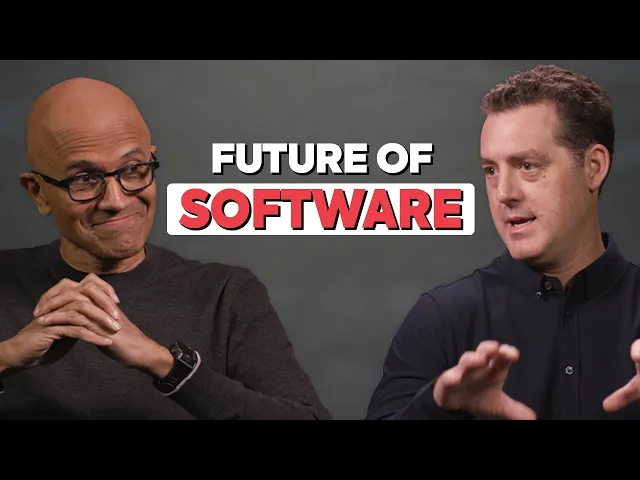Microsoft CEO Satya Nadella on the Future of AI

Satya's vision for a smarter AI future
Microsoft's CEO Satya Nadella recently shared his profound insights on the trajectory of artificial intelligence and how it's reshaping our technological landscape. In a candid conversation, Nadella articulated his vision of AI not merely as a standalone technology but as an integrative force that's becoming increasingly embedded in our digital experiences. His perspective offers a unique window into how one of tech's most influential leaders views the unfolding AI revolution and Microsoft's strategic positioning within it.
Key takeaways from Nadella's vision:
-
AI is evolving from narrow applications to becoming a pervasive platform capability that will fundamentally transform how software is built and experienced by users.
-
Microsoft is strategically positioning itself at the intersection of cloud infrastructure and AI applications, leveraging its Azure platform to deliver AI capabilities to developers and businesses worldwide.
-
The true value of AI lies not in the technology itself but in how it can be democratized and made accessible to solve real-world problems across industries and geographies.
-
Responsible AI development remains a cornerstone of Microsoft's approach, with Nadella emphasizing the importance of building trustworthy systems that align with human values and societal needs.
Nadella's most compelling insight is his framing of AI as a "co-pilot" rather than a replacement for human intelligence. This perspective represents a significant shift from earlier AI narratives that often centered on automation and job displacement. By positioning AI as an augmentation tool that enhances human capabilities rather than supplants them, Microsoft is charting a more optimistic and potentially more sustainable path for AI adoption.
This framing matters tremendously in today's context. As businesses grapple with how to incorporate AI technologies, the co-pilot metaphor provides a framework that's both less threatening to workforces and more aligned with how AI currently functions best—complementing human judgment, creativity, and ethical reasoning. It also helps address the "trust gap" that has emerged as AI capabilities have rapidly advanced, often outpacing our understanding of their limitations and potential risks.
What Nadella didn't extensively cover is how this co-pilot approach translates across different industry verticals with varying levels of technical sophistication. In healthcare, for instance, AI co-pilots might take the form of diagnostic assistance tools that help clin
Recent Videos
How To Earn MONEY With Images (No Bullsh*t)
Smart earnings from your image collection In today's digital economy, passive income streams have become increasingly accessible to creators with various skill sets. A recent YouTube video cuts through the hype to explore legitimate ways photographers, designers, and even casual smartphone users can monetize their image collections. The strategies outlined don't rely on unrealistic promises or complicated schemes—instead, they focus on established marketplaces with proven revenue potential for image creators. Key Points Stock photography platforms like Shutterstock, Adobe Stock, and Getty Images remain viable income sources when you understand their specific requirements and optimize your submissions accordingly. Specialized marketplaces focusing...
Oct 3, 2025New SHAPE SHIFTING AI Robot Is Freaking People Out
Liquid robots will change everything In the quiet labs of Carnegie Mellon University, scientists have created something that feels plucked from science fiction—a magnetic slime robot that can transform between liquid and solid states, slipping through tight spaces before reassembling on the other side. This technology, showcased in a recent YouTube video, represents a significant leap beyond traditional robotics into a realm where machines mimic not just animal movements, but their fundamental physical properties. While the internet might be buzzing with dystopian concerns about "shape-shifting terminators," the reality offers far more promising applications that could revolutionize medicine, rescue operations, and...
Oct 3, 2025How To Do Homeless AI Tiktok Trend (Tiktok Homeless AI Tutorial)
AI homeless trend raises ethical concerns In an era where social media trends evolve faster than we can comprehend them, TikTok's "homeless AI" trend has sparked both creative engagement and serious ethical questions. The trend, which involves using AI to transform ordinary photos into images depicting homelessness, has rapidly gained traction across the platform, with creators eagerly jumping on board to showcase their digital transformations. While the technical process is relatively straightforward, the implications of digitally "becoming homeless" for entertainment deserve careful consideration. The video tutorial provides a step-by-step guide on creating these AI-generated images, explaining how users can transform...
